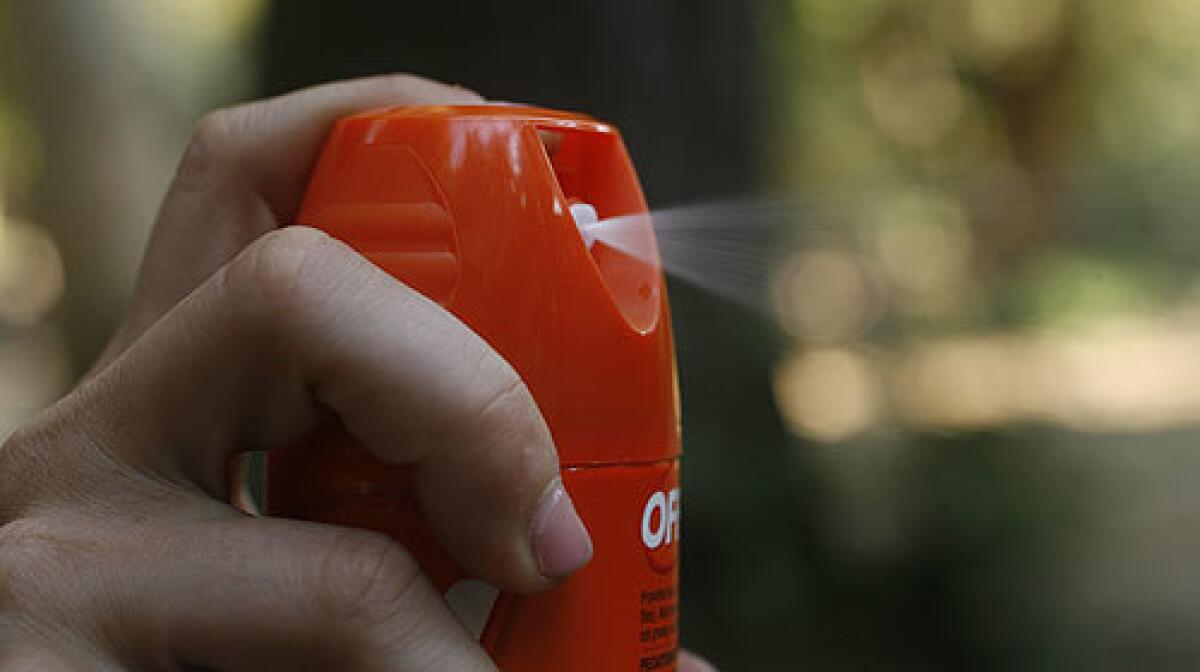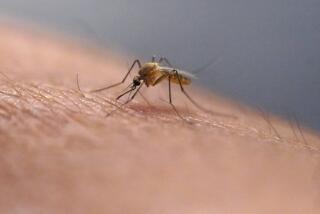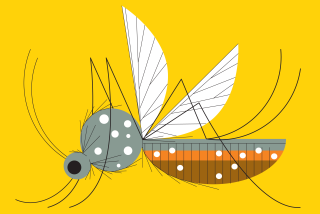With mosquito season in full force, learn to bite back

- Share via
Whether you’re a 10-year-old swimming in the lake at Camp Ka-ching-a or a 30-year-old having a drink on the terrace at the W, summer is the season for skimpy clothes, bare skin and, in a cruel twist, hungry mosquitoes. There’s nothing like a field of swollen, red, itchy bumps to set off that halter top.
And there are more mosquito mouths to feed than usual this year, says Truc Dever, director of community affairs for the Greater Los Angeles County Vector Control District. “There’s been an increase catapulted by the warm weather we’re having.”
But it’s not just the heat. The rash of home foreclosures is making the situation worse, Dever says, as stagnant water in abandoned pools turns into new breeding grounds.
So how to avoid getting bitten?
First, understand how mosquitoes find you: You lure them, with every breath you take. Or rather, with every breath you let out. They track you down by the carbon dioxide you exhale. They also zone in on body heat, lactic acid (a component of sweat), hexanoic acid (a fatty acid known to smell like “smelly” feet) and other substances we’re all endowed with -- some of us, it seems, more richly than others.
It’s true: Mosquitoes play favorites. Scientists have a way to go before they know exactly what puts you on the A-list. But they do know that when you exercise -- and you’re hotter and sweatier -- you’re more attractive.
In a group of 10, there’s one person on average who mosquitoes will prefer, says Jerry Butler, an entomologist at the University of Florida in Gainesville. There’s also one person the mosquitoes will turn up their antennae at. They’ll find the rest middlingly munchable.
Still, a mosquito’s brain is about the size of the dot on this “i.” Surely, humans can outsmart them.
Butler offers four ways to try:
1. Don’t go out at dawn or dusk. Those are happy hours for mosquitoes.
2. Wear clothes that cover as much skin as possible. Clothes treated with permethrin, an insecticide sold at outdoors stores such as REI and Adventure 16, are especially useful. You can buy pre-treated clothes at www.magellans.com or www.llbean.com.
3. Wear repellent.
4. Take along one of those people mosquitoes go mad for.
OK. Three rules and a devious scheme. No doubt you’re wondering which repellent you should wear. An army of researchers has been wondering about that for years, and they’ve separated myth from reality.
So what’s most effective? The standard has long been the chemical popularly known as DEET. The higher the concentration, the longer the protection lasts, but the federal Centers for Disease Control and Prevention and the American Academy of Pediatrics suggest using the lowest concentration that works for your needs -- usually that’s under 30%.
A study published in March in Science Express found that DEET interferes with mosquitoes’ perception of several sweaty odors, though not of carbon dioxide.
The observed effects? “They will still be able to figure out that you’re there,” says Uli Bernier, a research chemist in the Mosquito and Fly Research Unit of the U.S. Department of Agriculture’s Agricultural Research Service in Gainesville. “But you don’t taste good, so they back away.”
Though DEET doesn’t harm mosquitoes, some worry that it can harm people who use it. Studies have shown that frequent and prolonged use can cause brain cell death and behavioral changes in rats. However, after a safety review in 1998, the Environmental Protection Agency concluded that DEET does not pose a health risk to people as long as they follow label directions. Still, the American Academy of Pediatrics recommends not using it on children younger than 2 months.
Because not everyone is convinced of DEET’s safety, or likes how it feels (wet and oily) and smells (bad), alternatives are always being sought -- and sometimes found.
The CDC now rates picaridin -- another synthetic repellent -- as effective as DEET. It’s the active ingredient in Cutter Advanced Sport, a slimy liquid that goes on with an unpleasant chemical smell (the odor dissipates).
The only natural repellent the CDC rates as effective as DEET is oil of lemon eucalyptus. Repel and Cutter make lemon eucalyptus sprays.
Many other natural products -- with active ingredients extracted from catnip, celery, geraniums, soy beans and tomatoes -- are proven effective, though not always as effective as DEET or at least not as long-lasting.
BugBand contains geraniol and soybean oil. In its “spray lotion” form, it has the pleasant feel of a lotion and a fresh, minty smell. Another, Herbal Armor, also includes soybean oil, as well as citronella. This too feels nice on the skin; it has a lemony, musky aroma.
Exactly how these various compounds work isn’t known. “Perhaps mosquitoes don’t like how they smell,” says David Kulow, president of All Terrain in Sunapee, N.H., which markets Herbal Armor. “Or because they’re plant-based, mosquitoes think the wearer is a plant.”
More to Read
Sign up for The Wild
We’ll help you find the best places to hike, bike and run, as well as the perfect silent spots for meditation and yoga.
You may occasionally receive promotional content from the Los Angeles Times.








